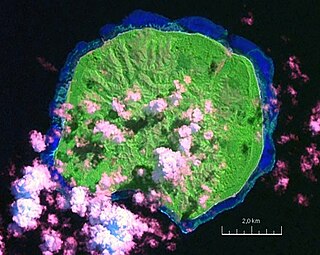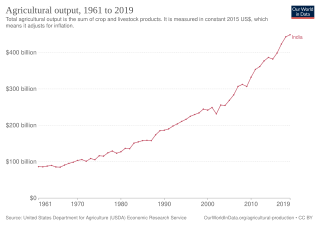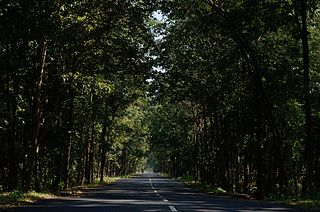
A farmer is a person engaged in agriculture, raising living organisms for food or raw materials. The term usually applies to people who do some combination of raising field crops, orchards, vineyards, poultry, or other livestock. A farmer might own the farm land or might work as a laborer on land owned by others. In most developed economies, a "farmer" is usually a farm owner (landowner), while employees of the farm are known as farm workers. However, in other older definitions a farmer was a person who promotes or improves the growth of plants, land or crops or raises animals by labor and attention.

The United States Department of Agriculture (USDA) is the federal executive department responsible for developing and executing federal laws related to farming, forestry, rural economic development, and food. It aims to meet the needs of commercial farming and livestock food production, promotes agricultural trade and production, works to assure food safety, protects natural resources, fosters rural communities and works to end hunger in the United States and internationally. It is headed by the Secretary of Agriculture, who reports directly to the President of the United States and is a member of the president's Cabinet. The current secretary is Tom Vilsack, who has served since February 24, 2021.

Organic farming, also known as ecological farming or biological farming, is an agricultural system that uses fertilizers of organic origin such as compost manure, green manure, and bone meal and places emphasis on techniques such as crop rotation and companion planting. It originated early in the 20th century in reaction to rapidly changing farming practices. Certified organic agriculture accounts for 70 million hectares globally, with over half of that total in Australia. Organic farming continues to be developed by various organizations today. Biological pest control, mixed cropping and the fostering of insect predators are encouraged. Organic standards are designed to allow the use of naturally-occurring substances while prohibiting or strictly limiting synthetic substances. For instance, naturally-occurring pesticides such as pyrethrin are permitted, while synthetic fertilizers and pesticides are generally prohibited. Synthetic substances that are allowed include, for example, copper sulfate, elemental sulfur and Ivermectin. Genetically modified organisms, nanomaterials, human sewage sludge, plant growth regulators, hormones, and antibiotic use in livestock husbandry are prohibited. Organic farming advocates claim advantages in sustainability, openness, self-sufficiency, autonomy and independence, health, food security, and food safety.

Organic certification is a certification process for producers of organic food and other organic agricultural products, in the European Union more commonly known as ecological or biological products. In general, any business directly involved in food production can be certified, including seed suppliers, farmers, food processors, retailers and restaurants. A lesser known counterpart is certification for organic textiles that includes certification of textile products made from organically grown fibres.

Cicia is a Fijian island of the Lau Group. One of the Northern Lau Islands, Cicia is volcanic and is composed of raised coral. Its area is 34 square kilometres (13 sq mi).

The Central Arid Zone Research Institute (CAZRI) is one of the biggest research institutes of the Indian Council of Agricultural Research (ICAR), an autonomous organization working under the aegis of the Department of Agriculture Research and Education (DARE) of the Ministry of Agriculture and Farmers Welfare of Government of India. CAZRI has the distinction of being one of the first institutes in the world exclusively devoted to arid zone research and development. The institute made a humble beginning in 1952 when Government of India initiated Desert Afforestation Research Station at Jodhpur to carry out research on sand dune stabilization and for establishment of shelter belt plantations to arrest wind erosion. It was reorganized as Desert Afforestation and Soil Conservation Station in 1957 and finally in its present form Central Arid Zone Research Institute in 1959 on recommendation of the UNESCO expert, Prof. C.S. Christian of the Commonwealth Scientific and Industrial Research Organisation (CSIRO), Australia. In 1966, the institute was brought under the administrative control of Indian Council of Agricultural Research (ICAR), New Delhi.

The history of agriculture in India dates back to the neolothic. India ranks second worldwide in farm outputs. As per Indian economic survey 2018, agriculture employed more than 50% of the Indian work force and contributed 17–18% to country's GDP.

The Kelappaji College of Agricultural Engineering and Technology (KCAET), the only Agricultural Engineering college in Kerala, is situated at Tavanur in Malappuram district and is named after the freedom fighter and social reformer Sri K. Kelappan.This institution is part of the Kerala Agricultural University.

Social forestry is the management and protection of forests and afforestation of barren and deforested lands with the purpose of helping environmental, social and rural development. The term social forestry was first used in 1976 by The National Commission on Agriculture, when the government of India aimed to reduce pressure on forests by planting trees on all unused and fallow lands. It was intended as a democratic approach to forest conservation and usage, maximizing land utilization for multiple purposes.

The Green Revolution was a period that began in the 1960s during which agriculture in India was converted into a modern industrial system by the adoption of technology, such as the use of high yielding variety (HYV) seeds, mechanised farm tools, irrigation facilities, pesticides and fertilizers. Mainly led by agricultural scientist M. S. Swaminathan in India, this period was part of the larger Green Revolution endeavor initiated by Norman E Borlaug, which leveraged agricultural research and technology to increase agricultural productivity in the developing world.
The agricultural policy of the United States is composed primarily of the periodically renewed federal U.S. farm bills. The Farm Bills have a rich history which initially sought to provide income and price support to US farmers and prevent them from adverse global as well as local supply and demand shocks. This implied an elaborate subsidy program which supports domestic production by either direct payments or through price support measures. The former incentivizes farmers to grow certain crops which are eligible for such payments through environmentally conscientious practices of farming. The latter protects farmers from vagaries of price fluctuations by ensuring a minimum price and fulfilling their shortfalls in revenue upon a fall in price. Lately, there are other measures through which the government encourages crop insurance and pays part of the premium for such insurance against various unanticipated outcomes in agriculture.

Shripad A. Dabholkar was an Indian intellectual and activist. He was the founder of a non-structured methodology of grassroot networking for nature-friendly neighbourhood development called Prayog Pariwar. His contributions were recognized by many awards including the 1985 Jamnalal Bajaj Award.

HaYogev is a moshav in northern Israel. Located around seven kilometres west of Afula, it falls under the jurisdiction of Jezreel Valley Regional Council. In 2019 it had a population of 711.
Coromandel International Limited is an Indian corporation founded in the early 1960s by IMC and Chevron Companies of USA and EID Parry, headquartered in Hyderabad, Telangana, India. Originally named Coromandel Fertilisers, the company is in the business of fertilizers, pesticides and specialty nutrients. The company is also in rural retail business in the states of Andhra Pradesh, Karnataka and Maharashtra through its Mana Gromor Centres. Coromandel International is part of Murugappa Group and a subsidiary of EID Parry, which holds 62.82% of the equity in the company. The company has sixteen manufacturing units located in the states of Andhra Pradesh, Tamil Nadu, Maharashtra, Gujarat, Rajasthan, Madhya Pradesh, Uttar Pradesh and Jammu and Kashmir. Its product line includes Gromor, Godavari, Paramfos, Parry Gold and Parry Super.
Participatory Guarantee Systems (PGS), as defined by IFOAM, are "locally focused quality assurance systems. They certify producers based on active participation of stakeholders and are built on a foundation of trust, social networks and knowledge exchange." They represent an alternative to third party certification, especially adapted to local markets and short supply chains. They can also complement third party certification with a private label that brings additional guarantees and transparency. PGS enable the direct participation of producers, consumers and other stakeholders in:

G. Nammazhvar was an Indian green crusader, agricultural scientist, environmental activist and organic farming expert best known for his work on spreading ecological farming and organic farming. He led the protest against the methane gas project started by Great Eastern Energy Corporation proposed in the Cauvery delta region of Tamilnadu. Nammazhvar was the author of several Tamil and English books on natural farming, natural pesticides & natural fertilizers and was featured in magazines & television programs.

India has a national tradition bound to agriculture fertility. In the North, the Indus valley and Brahmaputra region are critical agricultural areas graced by the Ganges and monsoon season. Based on 2011 World Bank data, only 17.5% of India's gross domestic product (GDP) is accounted for by agricultural production. It is a way of life for majority in the country mostly an estimation of 72% of the 1.1 billion people who live in rural India.
Krishi Unnati Mela is a three-day event launched by Prime Minister Narendra Modi on 19 March 2016 in Delhi. The fair was to create awareness among farmers about the latest agriculture-related technological developments.

The “Organic Market Development in Ukraine 2012 – 2016, Phase II” project is implemented by the Swiss Research Institute of Organic Agriculture (FiBL) and foster the growth of small and medium enterprises in the Ukrainian organic food sector by developing organic and regional food supply chains.
Lisa Cindy Kivirist is an American author, women-farmer and cottage-food activist, entrepreneur, and writer. She founded the Rural Women’s Project. for the Midwest Organic and Sustainable Education Service and started the award-winning Inn Serendipity Bed & Breakfast, a small business completely powered by wind and solar energy generated on site and Wisconsin Travel Green certified.














